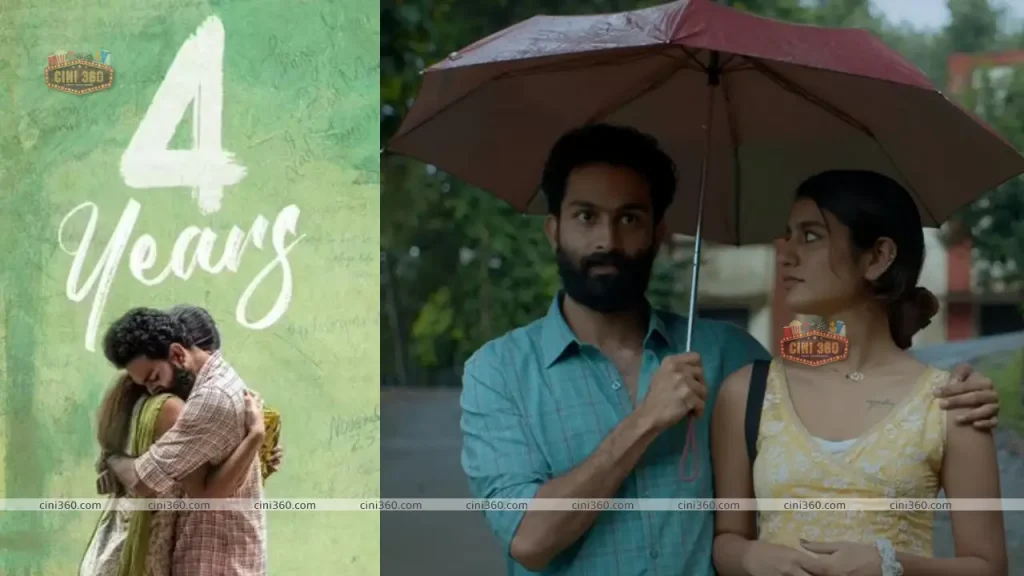4 Years is currently streaming on Amazon Prime Video.
The romance drama 4 Years, directed by Ranjith Sankar, aspires to be the next Before Sunrise. It doesn’t quite reach the soaring heights of the Richard Linklater movie, but it also doesn’t come up short.
Story: The journey of 4 Years’ protagonists Gayathri, an independent, spiritual woman with ambitions for her life, and Vishal, a temperamental young man with a tonne of supplemental examinations and skills that don’t fly because of his attitude, is centred around the final two days of college life. The couple searches for resolution in their relationship and wishes that the last day could go on forever.
Review: In the dialogue between the main characters of Ranjith Sankar’s 4 Years, Vishal (Sarjano Khalid) and Gayathri (Priya Prakash Varrier), a haiku about clinging to hope is cited. When the movie is over, you will go back to this scene since it perfectly sums up the movie, which is based on a campus yet isn’t your typical college romance. In actuality, the focus is primarily on the two main characters and their fluctuating emotions, which are typical of their age and situation—specifically, the last two days of their college lives.
The beginning of the film introduces their present dynamic they split up and haven’t spoken in the previous six months. It becomes clear throughout the film that Vishal’s rage and vanity greatly contributed to that. You can also see that there’s a reason behind everything; Vishal’s dissatisfaction comes from not being able to blend in with the rest of his classmates, who have all found employment or are continuing their education while he has stay behind to complete his more than 30 additional tests. He really stayed at the college mostly because of Gayathri, despite realising in his first year that he was not cut out for engineering.Ranjith’s achievement in this case is that he builds a realistic picture of how college life has been for both Vishal and Gayathri while not visually depicting any of this.
In that regard, 4 Years is a love drama that aspires to be Before Sunrise. It doesn’t quite reach the Richard Linklater movie’s lofty heights, but it also doesn’t fall short. In reality, except from a few hiccups in some parts, like the one where Vishal accuses Gayathri of being the cause of his failures, the narrative, the music, and the cinematography make this a calming watch. Sarjano and Priya both provide natural-looking performances. Priya portrays Gayathri, who is conflicted about her feelings for Vishal, admirably. In keeping with the narrative, she refrains from letting the character act dramatically. Vishal’s facial expressions and behaviour as Sarjano reflect his remorse and want for another opportunity to make it work because since she has been his greatest asset during his time in college. Ranjith doesn’t place him in the Arjun Reddy mould, and he makes no attempt to fit it.
Ranjith deserves praise for attempting to craft a college movie without include any of the lively student life that characterises the genre. The authentic circumstances and surroundings he places his characters in serve to highlight the natural performances. In fact, staying too long on these moments might not have worked for other films, but Ranjith manages to pull it off in 4 Years because his characters here also don’t want the day to end and keep coming up with excuses to spend more time together.
The heartfelt, beautiful tunes composed by Sankar Sharma, the music director, greatly enhance 4 Years. Each song fits seamlessly into the narrative and progresses with the tone of the movie; nothing feels out of place. The different locales in this film, when combined with Salu K Thomas’ cinematography, are guaranteed to bring back memories of college for many viewers. While it might not be a full-speed trip down memory lane, Vishal and Gayathri invite you to join them as they navigate love, perplexity, joy, heartache, and hope in their world.
Verdict: The love drama from director Ranjith Sankar is a calming watch because of its memorable leads and outstanding score.




